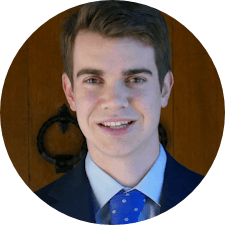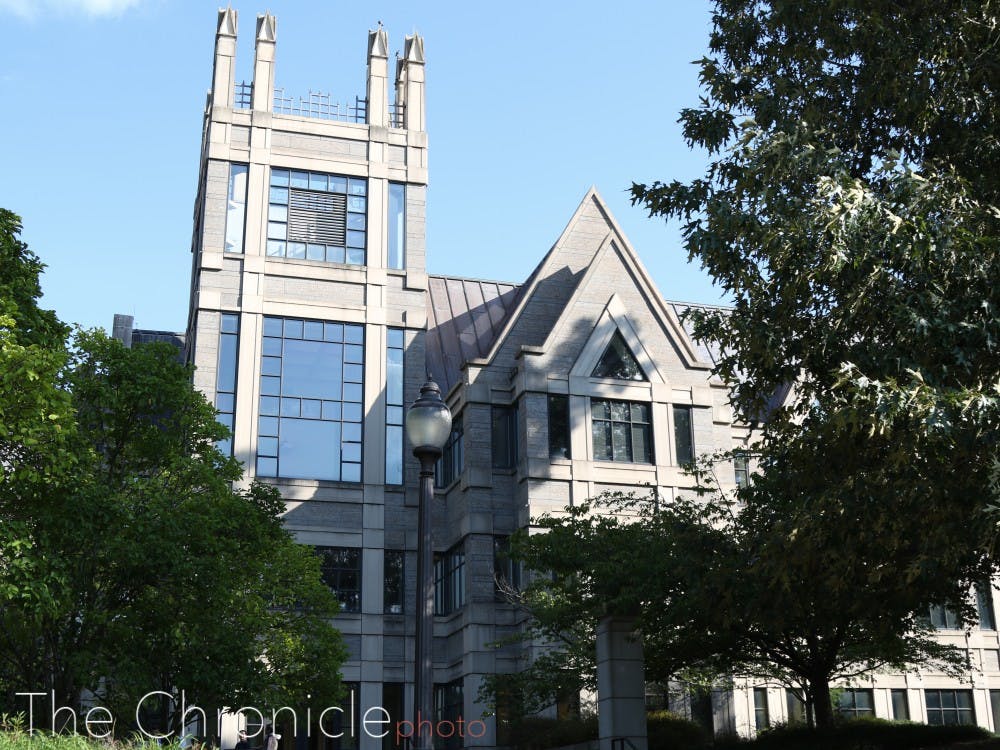Cal Newport, associate professor of computer science at Georgetown University, spoke Thursday about how to navigate distractions in the digital age.
The Sanford School of Public Policy hosted the lecture, “Why Can't I Focus? On Emails, Smartphones, and the Age of Distraction,” as part of its Crown Lecture in Ethics Series. Newport presented data on “techno distraction” and proposed ways to address the unintended side effects of smartphone and email usage.
Newport began the lecture by describing Georgetown’s focus on digital ethics as a “tier one concern.” He co-founded Georgetown’s Center for Digital Ethics and is the inaugural director of a new bachelor’s degree program in Computer Science, Ethics, and Society.
Newport shared a study that took data from 26,000 knowledge workers and timed “the average gap between checks of an email inbox or chat program like Slack.” The median time between these checks was a mere six minutes.
“This is a big deal. This is taking up a lot of our time,” Newport said. “This is something that is having a notable impact on our day-to-day experience.”
He is mainly concerned with the cost that this dependence has on our cognitive resources.
“Network switching is a relatively expensive neurological process,” he said. “We have to inhibit some semantic networks within our brains, we have to activate other networks — this takes a little while to do.”
To Newport, these constant “cognitive context shifts” lead to burnout and anxiety.
He pointed to 2012 as a key year in the adoption of smartphones, when they reached 50% of the mobile phone market.
“This is the first year where we really saw college students bringing smartphones to campus at a large rate, and anxiety, anxiety-related depression [went] up,” he said.
Newport emphasized, however, that the side effects of email and the smartphone were not necessarily intended by their designers.
“If you go back to 2007 … what was on their mind when they released the iPhone? The idea that we were supposed to check it 150 times a day was nowhere to be found,” he said.
Instead, Newport pointed to lessons from his scholarship in understanding what happened with these technologies.
“My claim [is] in stories like email and stories like the smartphone, what we’re really dealing with … is a complex dynamical system,” Newport said. “The famous original example of these systems is … the butterfly flapping its wings in Brazil, and you end up three days later with a typhoon in Japan.”
By viewing humans’ relationship with technology as a complex dynamical system, Newport found guidance on how to address unintended consequences.
Newport says that this relationship "tells us that we can't be confident that we can always stop bad technologies before they come out.”
Newport also explained that it’s hard to tinker with dynamical systems. Small adjustments lead to large, unpredictable consequences. Newport referenced the proposed Kids Online Safety Act, which seeks to protect kids’ experiences online.
“That turns out to be really hard to do,” Newport said. “And everyone's turning on it, because there's complexity and side effects.”
According to Newport, understanding technologies as systems provides a key solution: removing the input. He suggested that, instead of debating when it is appropriate for kids to use the internet, “maybe kids just shouldn’t.”
“That is effectively from a dynamical system point of view saying, look, let's take that input back out again … Let's be a little bit more careful about how we add this back,” he said.
Newport said that his most recent book, “A World Without Email,” argues that combating digital distractions is something that can’t be fixed with just a “bunch of tips.”
“We have to effectively remove email, [and] build from scratch a different, explicit way for how we collaborate in our companies,” he said. “Then and only then can we carefully add back email.”
Manish Murthy, a second-year master’s student in engineering management, approached the talk from a different perspective, having not used social media like Instagram for the past few years.
He related his previous experiences trying to quit social media to Newport’s discussion about how social media imposes structures that make it harder to quit.
“I have tried to walk away from social media at times when I wasn’t that connected with my friends and it wasn’t really possible, because it kinds of sets you in a direction of loneliness,” Murthy said.
It was only after Murthy developed a stronger friend group that he was able to quit social media for good.
Simranjeet Dua, a second-year master’s student in engineering management, said that Newport’s advice on “removing the input” strongly resonated with him.
“I have been trying to reduce my social media, but sometimes the best thing is just to uninstall the app,” he said.
Get The Chronicle straight to your inbox
Signup for our weekly newsletter. Cancel at any time.

Michael Austin is a Trinity sophomore and managing editor of The Chronicle's 120th volume.

